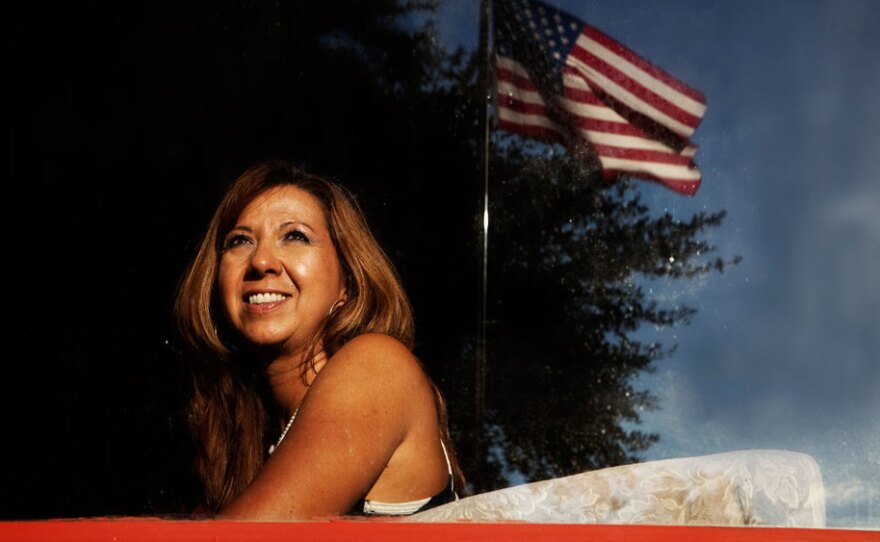More than 250,000 female soldiers, sailors, Marines and airmen have served in Iraq and Afghanistan and supporting operations since October 2001.
They make up the largest group of female veterans in U.S. history.
And often, these women bond with each other well after they serve.
Bound By Combat Experience
Yolanda Mayo and Rose Noel have a friendship that is bound by combat experience, motherhood and an understanding of what it means to be a female veteran.
Society is still slow on the uptake that we're out there doing the same thing the guys are doing, which means that we're going to come home wounded.
Mayo lives in a quiet, suburban neighborhood not far from Camp LeJeune in Jacksonville, N.C. Her comfortable home is filled with military keepsakes, from the enormous shell casings flanking her fireplace to a vintage set of Marine Corps china on her dining room table.
"It's a china pattern that I actually found, I mean, it was at a yard sale, it had the gold and the green and it had an emblem on it, and I was like this is fabulous!" she says.
Mayo is a Marine reservist with many years of active duty including three tours of Iraq under her belt. Her friend, Noel, visiting from just outside Jacksonville, Fla., spent two decades in the Marines and also served in Iraq. Noel says the china doesn't surprise her at all.
"I would expect nothing less from Yolanda -- being a sergeant major in the Marine Corps -- that that's what she should have in her dining room," Noel says.
'We're Going To Come Home Wounded'
Mayo and Noel both joined the Marines during college in the early 1980s, when women were still required to wear the same regulation shade of red lipstick. By the time they deployed during Operation Iraqi Freedom, Mayo says, the old rules barring women from combat didn't make sense any more.
"How do you exclude from combat when combat comes to you no matter where you're at?" she says. "There isn't a front line. That front line thing in the past in World War I, II -- that's not warfare of today."
Noel, a well-dressed, Volvo-driving mother of two, was awarded a Purple Heart after she was injured. She says sometimes people just don't believe it's hers.
"I have a Purple Heart license plate, and a lot of people ask me, you know, what happened to my husband? You know, where was he when he got hurt?" she says. "Society still is slow on the uptake that we're out there doing the same thing the guys are doing, which means that we're going to come home wounded.
"And there are going to be many more of us," Mayo adds.
Mayo was a public affairs officer in Iraq. In 2003, she spent weeks on a truck with Marines traveling from Kuwait to the heart of Iraq. Noel was on base in 2005 when shrapnel from a rocket pierced her cheek and broke her jaw. Surgeons wanted to send her home, but Noel -- who headed a 700-member squadron -- refused.
"I took away that part of the equation for people to say, 'She went home because she was a woman,'" she says. "That's something that's brought up a lot, is whether women are going to be strong enough to handle a combat situation. And I think that definitely is an important part of setting the example and the tone."
A Constant Juggling Act
When Mayo was deployed, her husband cared for their children. Noel, who's divorced, left her sons with her mom in Michigan. She says most mothers can't relax after a deployment.
"She comes right from being the Marine or the soldier or sailor to Mom, and there is no transition," Noel says.

"Even when deployed, you don't stop being a mom," Mayo says. "I had teachers e-mailing me with grades and telling me things that were going on."
Both Mayo and Noel say being on active duty was a constant juggling act. They have PTSD-related insomnia from years of erratic sleep schedules and combat missions. But both say they're proud of their military and personal accomplishments.
"Hopefully some young females will be able to see that there are role models out there," Noel says.
"You can kind of have it all -- you can be a mom, you can be a wife, and you can be a Marine, a soldier, an airman, whatever you choose," Mayo says. "If you want to serve your country, you can do it."
Mayo says there are now five female sergeant majors, including herself, in the Marine Corps Reserve. She's looking forward to the day when there are just too many to count.
Copyright 2022 North Carolina Public Radio. To see more, visit North Carolina Public Radio. 9(MDAzMjM2NDYzMDEyMzc1Njk5NjAxNzY3OQ001))





